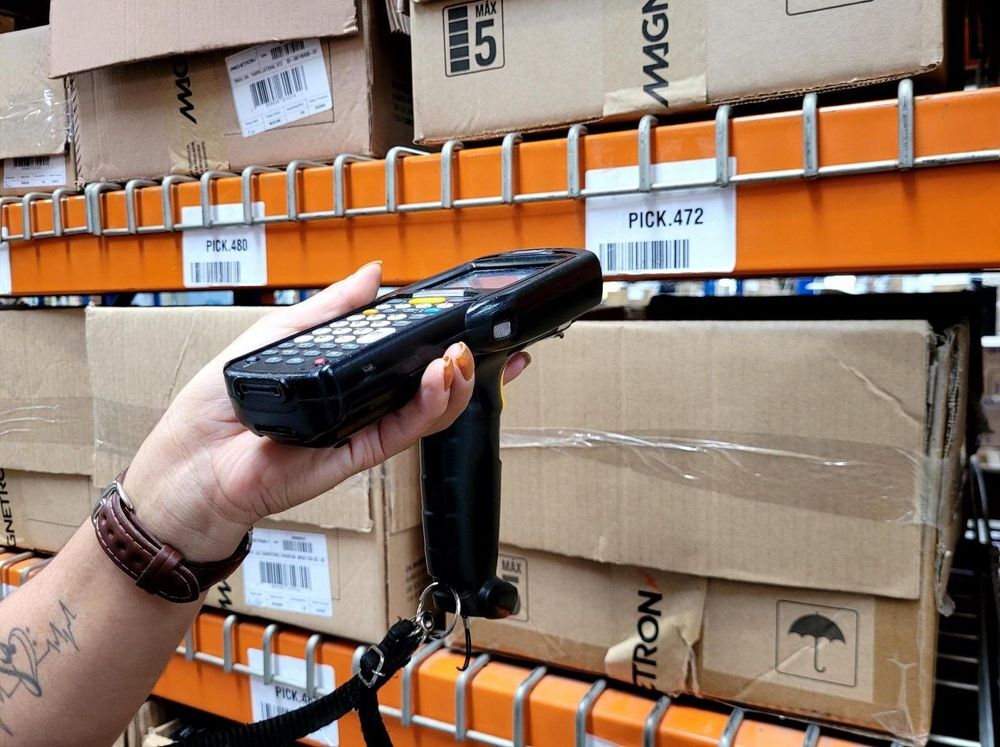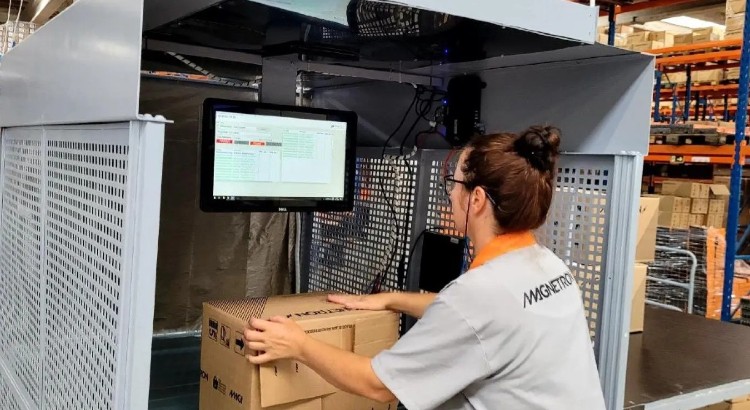Integração da solução de hardware e software implementada pela Parson
With Beontag labels and the integration of hardware and software solution implemented by Parson, another challenge was overcome: the full scanning of tags attached to the metal parts, without any disturbance.
The agility and assertiveness binomial have always guided the steps of entrepreneur Denise Remor. Since she took over Magnetron in 2009, her purpose has been clear: to do right thing based on efficient, economical processes with high productivity. In this context, deploying radio frequency identification systems (RFID) made perfect sense. But she reminds us that adopting such disruptive technologies always requires a step back. “You have to create a corporate culture, which allows innovation and interaction between all links in the chain to become a reality.”
And thanks to this culture, Magnetron, a market leader in the industrialization of electrical parts for motorcycles, was the first Brazilian industry to overcome cultural and practical barriers and install the RFID system on your product packaging. Technically, the great challenge has always been to guarantee a perfect box scanning, dribbling the interference of the metal in parts.
Challenge accepted and accomplished. Now, Magnetron is proud to serve its direct customers (parts distributors, large retailers, and repair shops) with the right parts, in the right quantities, with agility and efficiency. “It’s no good having a pretty box if half of the products inside it is not what was ordered. And that was our challenge before the RFID implementation,” recalls the entrepreneur.
The results could not be more positive. Besides a payback of the investment of BRL 245,000 in 12 months, Magnetron reduced operation costs by 7% and increased the order output speed by 43%. “This 43% had a direct impact on the company’s revenue,” recalls Denise.
This is because, before RFID, to invoice BRL 1 million in orders, 14 hours of work were needed, and now this work is easily performed in 8 hours. In other words, there was a gain of 6 hours that allows to bill more with less people in the operation. The RFID system, implemented by Parson and with Beontag labels, runs with 2 operators, compared with the 10 operators needed in the past.
And if before there were errors, today they are practically zero. Rafael dos Santos de Oliveira, Logistics, Manufacturing and Shipping Supervisor at Magnetron, recalls that in one of the months in 2022, the company reached an inventory adjustment record. “When we made the inventory balance, the difference from what had been shipped was only BRL 14.00. A virtually insignificant value if we consider an inventory valued at BRL 20 million. That was the most perfect month in our history”, he celebrates.
Roberto Cordeiro, from Parson, the integrator responsible for the project, also celebrates the savings and improvements at Magnetron as a result of the RFID system implementation and reminds that this is a particularly interesting success case, because it allows the scanning of the metal part tags inside a box. “This has always been a major difficulty for RFID, and we were able to overcome it at Magnetron, ensuring total reliability in the process.”
“The savings came tied to increased productivity. And to crown all this success, we recently presented this case to GS1 Brasil, emphasizing that the Beontag labels used at Magnetron contain three information levels: RFID, product bar code and QR Code, which also refers to the website where the user can find the part description. One of the GS1’s goals is to set this application as Case of the Year, besides recognizing it as the first in the manufacturing sector; until then, the entity only recognized retail applications”, adds Roberto.

End-to-end technology
Today, Magnetron’s existing portals scan the items leaving the stock. For 2023, the company is studying the installation of new shipping portals that will consolidate shipments with carriers. But will only corporate culture and modern technologies make this RFID project feasible? The answer is no! All project stakeholders are unanimous in affirming that nothing would have happened without Beontag’s cutting-edge RFID tags.
“Although Magnetron products are almost 100% made of metal, a very challenging material for UHF RFID tags, we chose to use a flexible tag, without the need for specific tags for metal surfaces,” explains Adriana Ferreira, Beontag’s Brazil RFID Sales Channel Director.
According to her, the tag technology has advanced so much and so quickly that the chips have already reached an extraordinary sensitivity, which makes it possible to use standard RFID tags in applications considered difficult for a full scanning.
“Another important factor that makes a big difference is the antenna design. Thanks to the expertise and resources from the RF (radio frequency) laboratory that Beontag maintains in Brazil, we can simulate the customer’s application. And the team of qualified professionals is fully committed to solving any problems that may arise during tests”. Adriana also points out that the partnership with Parson was essential to offer and choose the best RFID tag for Magnetron.
” RFID came to definitely optimize what we have been doing reasonably well and that, now, we do with maximum excellence. The impact was extremely positive by reducing to zero the customer complaints”, celebrates Denise Remor, Magnetron’s president.
And she adds: “A happy customer is loyal and strengthens its relationship with the company. Partners who are integrated and aligned to a purpose also guarantee this result. Operational efficiency has always been on our agenda, and with a clear strategic planning, we seek alternatives to better serve customers, striving for effectiveness and lower costs.”
From idea to implementation, assertiveness
The RFID success reflexes at Magnetron are not only felt from the outside. According to Rafael dos Santos de Oliveira, the operators who work in the portal every day absorbed the innovation in a positive way, they were delighted and, why not say, fell in love with the technological solution, to the point that they cannot work anywhere else without a portal.
And what are the next steps? According to Denise Remor, Magnetron closely monitors technological innovations and relies on partners such as Beontag and Parson to recommend the best solution and follow up its implementation. “The innovations that make sense to our operation will be assessed. We just can’t know what that technology will be, but we have our antennas switched on to continuously improve.”
So much so that, after understanding that the RFID solution was ideal for its needs and would fit perfectly with its product, Magnetron developed the project and started the implementation. But as with any process, having state-of-the-art technology is not enough; people (and their commitment) are essential. “We found in Beontag and Parson the best partners. Even though it was a long and complex process, we had no problems along the way; everything came to me in a smooth and seamless way,” remembers the entrepreneur.
That integration resulted in a transparent process, which respected the time of each chain link. And since demands come vertically, in line with the company’s strategic planning and guidelines, Magnetron’s logistics and operations departments were able to evaluate whether the cost-benefit ratio and technology would meet the company’s desires and needs.
And what would they do differently in the RFID case? According to Denise, the answer is: “Nothing, because we got what we wanted, and we know that technological improvement is a process. So much so that this year, with Parson’s support, we implemented a new scanner that guaranteed an even better RFID tag scanning. At the beginning of the process, that technology was not available. Even so, we have always been very efficient with the Beontag tags.”
As Adriana Ferreira, from Beontag, reinforces, a project to implement a radio frequency identification system like Magnetron’s is maintained by three pillars: equipment and software (Parson), tags (Beontag) and the customer’s openness to innovation.
“Parson naturally has this vision of integration, but the synergy we have had with Beontag for so many years is very important. It makes the problem identification and discussion and the joint development of solutions easier, and often opens space for the creation of new products,” adds Parson’s Roberto Cordeiro.
Magnetron’s history validates that strategy. In 2012, when the entrepreneur Denise Remor sold the stationary motors and their couplings operation and directed all her entrepreneurial energy to the company, she had already understood that innovation and integration go hand in hand to obtain good results.
So much that, with a lot of technology embedded in the operation, a team committed to the company’s purposes and suppliers in tune, the entrepreneur is proud to be at the head of an operation with heart and soul, guided by the game of ‘win-win’. “If we consider that we spend more time at companies than in our homes, it is clear that one of the leader’s roles is to provide a pleasant and welcoming work environment, which ensures a good mental health for everyone: employees, partners and customers.”
Definitely, an arid area, such as motorcycle parts, has been humanized by this entrepreneur and this humanization has become one of the pillars for good business.
Article available: https://www.beontag.com/cases/rfid-overcomes-barriers-and-guarantees-magnetron-an-increase-in-productivity-and-revenue/
